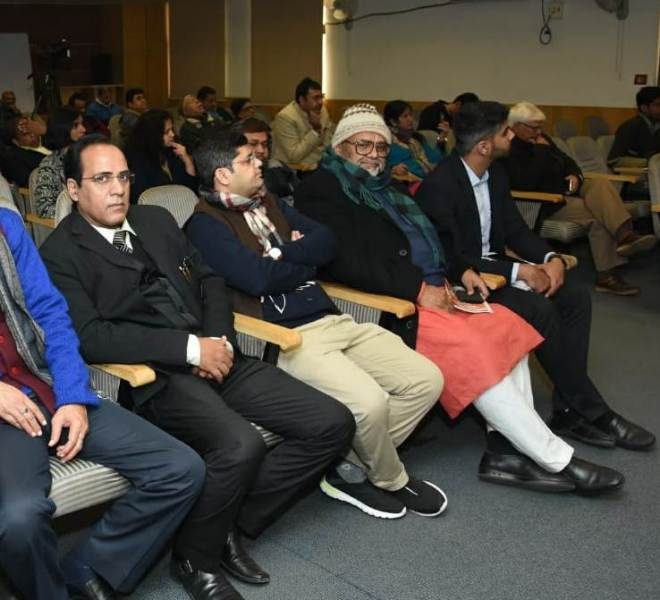Release of booklet on 1971 Bangladesh Genocide
Total Views |
“War criminals of 1971 Bangladesh liberation war should be punished for their atrocious crimes, only then we can celebrate the golden jubilee of Bangladesh’s independence in true sense,” said Prof Veena Sikri, Former Indian High Commissioner to Bangladesh. She was speaking at an event organised by Indian Policy Foundation (IPF) at Malaviya Smriti Bhawan, New Delhi. She asked the global community to support Bangladesh government in its demand for the trial of war criminals of Pakistani army for its misdeeds during Bangladesh Liberation War of 1971.
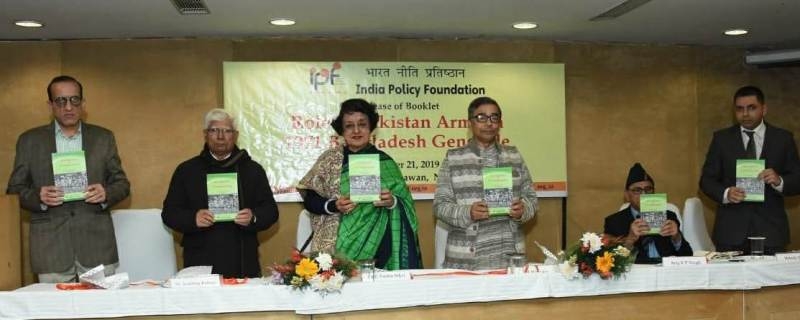
The event was organized to release a booklet titled “Role of Pakistan Army in 1971 Bangladesh Genocide”, co- authored by Brig. RP Singh, VSM (Retired) and Hitesh Singh, and published by IPF. In the booklet, Brig. RP Singh has given a first person account of the Genocide he witnessed as an Indian Army officer in 1971. The booklet was released by Mr. Farid Hossain (Minister of Press in Bangladesh High Commission) and Prof. Veena Sikri, in the presence of Prof. Rajvir Sharma. The booklet gives accounts of the brutal atrocities of Pakistan army on Bengali people, especially Hindus, during the nine-month period from March to December 1971.
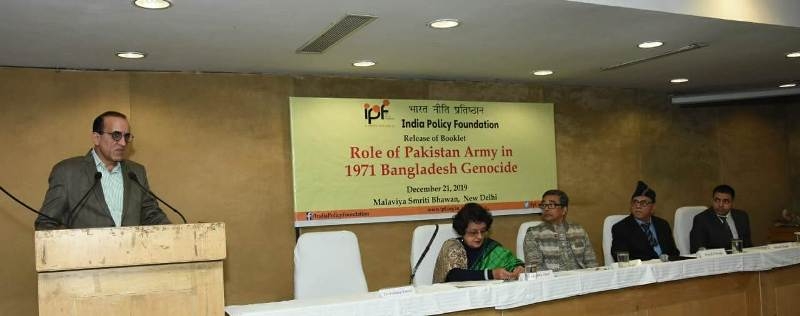
Outlining the theme of the booklet, Dr. Kuldeep Ratnoo, Director of IPF, said that on March 26, 1971, Pakistan army launched the Operation Searchlight to curb the Bengali nationalism movement in East Pakistan. In the operation, lakhs of innocent people were brutally murdered and women were kidnapped, raped, tortured and killed. He expressed disappointment over ignorance among Indian youth about 1971 Bangladesh Genocide. “Entire humanity must be as ashamed of 1971 genocide as it is about Holocaust. But unfortunately, there have been attempts to downplay the mass murder and rape of Bengali people by powers that were sympathetic to Pakistan at that time. However, this booklet again brings to light the brutalities of Pakistani armed forces and their Islamist agents,” said Dr. Ratnoo.
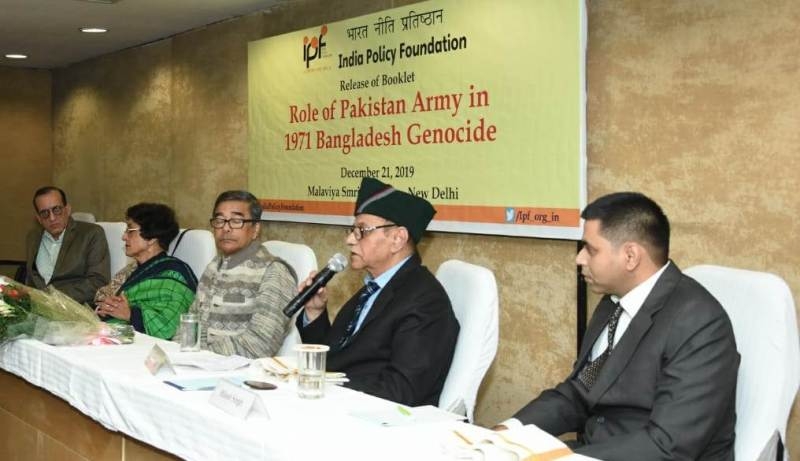
Brig. Singh, in his address, gave specific information about the brutalities and atrocities by Pakistan army in 1971. He also shared some of the experiences of his various roles during the Bangladesh liberation war.
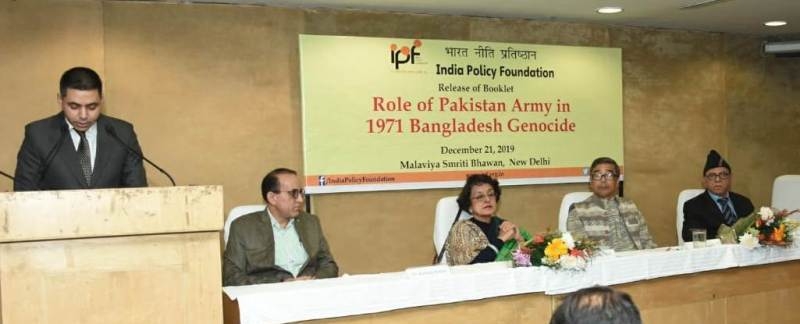
Co-author of the booklet, Hitesh Singh told the audience how then President of Pakistan General Yahya Khan, Pakistan Army officer Lt. General Tikka Khan and political leader Zulfiqar Ali Bhutto conspired to teach Bengali people a ‘brutal lesson’, which they would never forget. He said the total number of innocent Bengali people killed by Pakistan armed forces and their Islamist agents could be as high as 3 million. Besides this, more than 10 million people were forced to leave East Pakistan and run towards India for security, during the course of nine months. He said that war of 1971 can be seen in two ways, firstly, all the killings were executed by Pakistan army, and secondly, General Tikka Khan involved the non-military Islamist ‘Razakars’ in his brutal deeds.
He also laid focus on the mentality behind 1971 Genocide. He said the Pakistani army officers were trained mentally to execute such brutalities on civilians. They especially targeted Hindus and Awami League members. He compared Pakistan army’s attitude towards them with that of Nazis’ attitude towards Jewish people. As a result, even the unarmed civilians, who were running towards India for safety, were shot dead while crossing the Ganga river. Lakhs of Hindus were killed or forcefully converted to Islam. Pakistan army didn’t stop there, and it is still following the same method of brutally torturing the innocent people of Balochistan and Gilgit- Baltistan.
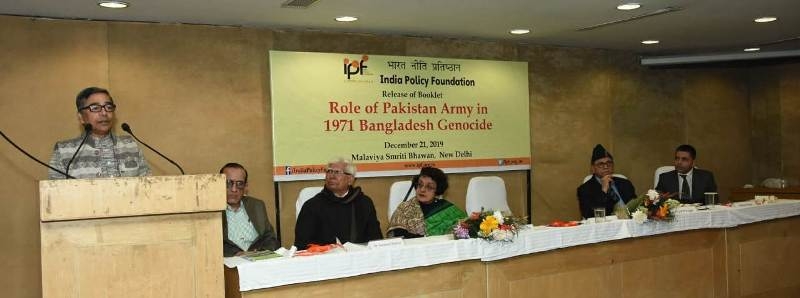
Mr. Farid Hossain, Minister, Press in Bangladesh High Commission, informed that when Operation Searchlight began in March 1971, he was an 18 year old student at Dhaka University. When Pakistan’s then President Yahya Khan ordered its army to persecute the civilians of East Pakistan, it mainly targeted local police barracks and dormitories/hostels of Hindu students studying in Dhaka University. He recalled that the whole city of Dhaka was attacked by rockets and there were killings, loot and arson everywhere. Residents of cities and towns were forced to leave their homes due to such brutalities of Pakistan army.
Farid Hossain credited the Indian forces for their contribution in leading the Mukti Bahini soldiers during the Liberation war. However, condemning Pakistan, he said, it still feels no remorse for those atrocities. It hasn’t even tendered a formal apology to people of Bangladesh. On the contrary, when government of Bangladesh decided to put on trial the war criminals living in Bangladesh, Pakistan’s government opposed any trial of 1971 war criminals. “It is quite ironical that these days Pakistan talks about human rights,” he remarked.
Mr. Hossain praised Bangladeshi Prime Minister Sheikh Hasina for her firm decision to put on trial war criminals despite the opposition from various quarters. He also added that after coming into power, firstly in 1996 and later in 2009, she worked with determination to punish the war criminals found guilty after investigations.
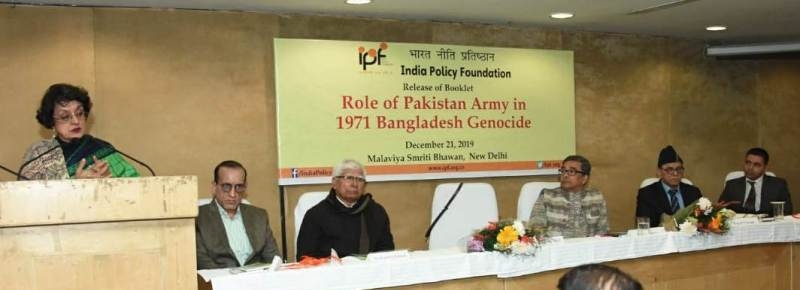
Prof Veena Sikri, former Indian High Commissioner in Bangladesh, said that the 1971 Genocide should be studied in detail. She informed that Indian Prime Minister Shri Narendra Modi and his Bangladeshi counterpart Sheikh Hasina have decided about the joint celebration of golden jubilee of Bangladeshi liberation in 2021. She also stated that in the same year there will be birth-centenary of the “Father of Bangladesh” Sheikh Mujibur Rehman.
She gave full credit to Prime Minister Sheikh Hasina for the trial of war criminals in spite of the objections by Pakistan, Turkey and Saudi Arabia. She also gave reference of Pakistan government appointed Hameed-ur-Rehman Commission’s report of 1972, in which the issues of brutalities and immoral acts by Pakistan army were subtly mentioned. Prof Sikri advocated that wider dissemination of information about the joint victory of Indo-Bangladesh forces would make students aware about the facts related to 1971 Bangladesh Genocide.
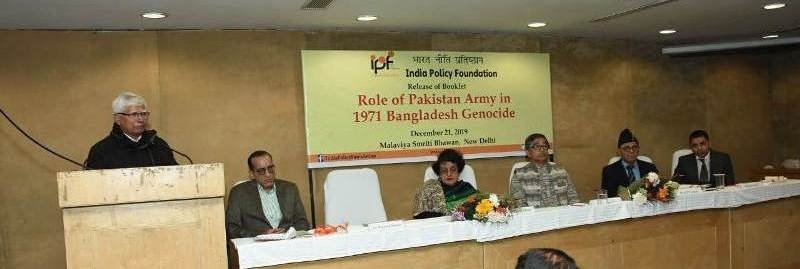
Retired Delhi University Professor Rajveer Sharma concluded by demanding that India should work closely with its neighbour Bangladesh to ensure punishment to the war criminals of 1971 Genocide.
